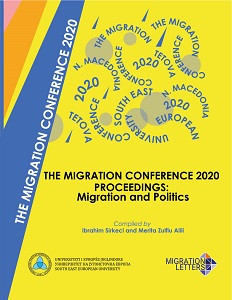Lebanon And The Lack Of Refugee Protection: From The Absence Of A National Refugee And Asylum Policy Over Increasing Unemployment And Poverty Rates To The Threat Of More And More Statelessness
Lebanon And The Lack Of Refugee Protection: From The Absence Of A National Refugee And Asylum Policy Over Increasing Unemployment And Poverty Rates To The Threat Of More And More Statelessness
Author(s): Laura El Chemali
Subject(s): Welfare systems, Social differentiation, Migration Studies, Socio-Economic Research, Asylum, Refugees, Migration as Policy-fields
Published by: Transnational Press London
Keywords: Lebanon; refugee protection; absence; national refugee; asylum; policy over increasing; unemployment; poverty rates;
Summary/Abstract: In March 2020, the Syrian conflict entered its ninth consecutive year, meanwhile continuing to trigger unprecedented humanitarian, demographic and geographical problems with far reaching consequences for Syria and its neighbouring countries. With 6.5 million internally displaced persons and at least 4.8 million Syrian refugees who have fled the country since 2011, Syrians have become the largest refugee community in the Middle East . Over the course of the conflict, Lebanon, which has a population of approximately 4 million, has received more than 1 million Syrian refugees . In 2018, this number declined for the first time under 1 Million. However, unofficial number are said to be much higher than those published by the UN Refugee Agency in Lebanon. While Lebanon turned into the most important refugee reception state worldwide, Lebanese state authorities have neither been able to mitigate nor to respond to this high-impact and vigorous influx of (Syrian) refugees, acting as a weak host state. Despite the fact that prior to the Syrian refugee crisis, Lebanon had received millions of refugees from Palestine, Lebanese state authorities have failed to implement a coherent national strategy for the management of the Syrian refugee crisis in their country . Considering the highly elevated needs in combination with a persistent underfunding, as well as, the absence of sustainability in the various sectors, such as electricity, health care, education, waste management or water, poverty and unemployment rates in Lebanon have risen to worrisome levels. Consequently, this article is driven by the interest to explore the various dynamics behind the mismanagement of the Syrian refugee crisis in Lebanon and the reasons why Lebanon has attained in the last quarter of 2019 nearly the stadium of state collapse.
Book: The Migration Conference 2020 Proceedings: Migration and Politics
- Page Range: 27-35
- Page Count: 9
- Publication Year: 2020
- Language: English
- Content File-PDF

